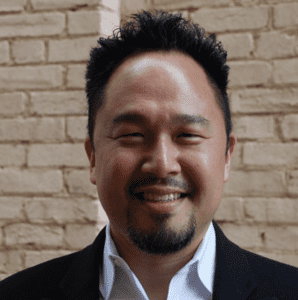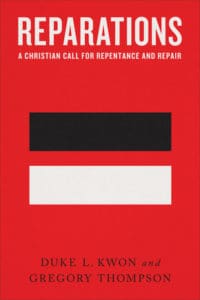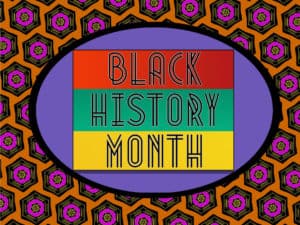“Christians are awakening to the legacy of racism in America like never before. While public conversations regarding the realities of racial division and inequalities have surged in recent years, so has the public outcry to work toward the long-awaited healing of these wounds….This book makes a compelling historical and theological case for the church’s obligation to provide reparations for the oppression of African Americans.” – From Brazos Press website
 We recently talked with Duke Kwon, co-author of Reparations: A Christian Call for Repentance and Repair, about his latest book with Gregory Thompson. Duke serves as the lead pastor of Grace Meridian Hill, a congregation in the GraceDC Network in Washington, D.C. Following the short interview is an excerpt from their new book.
We recently talked with Duke Kwon, co-author of Reparations: A Christian Call for Repentance and Repair, about his latest book with Gregory Thompson. Duke serves as the lead pastor of Grace Meridian Hill, a congregation in the GraceDC Network in Washington, D.C. Following the short interview is an excerpt from their new book.
CSA: How did this book come to be? Tell us a bit about your journey to and through writing.
Kwon: Several years ago, I was invited to speak on reparations at a conference where Greg was also a presenter. Afterwards, we expressed mutual interest in writing a book on the topic from a Christian perspective. Both of us were persuaded not only that reparations is a biblical imperative, but also that racial healing in America requires it and the Christian church has a singular responsibility to address it.
For me, those convictions had deepened during my years of ministry in Washington, DC, a historically Black city. Loving my neighbors meant sitting at the proverbial feet of Black intellectuals, theologians, church traditions, and ordinary neighbors. And in doing so, I came to see that the logic of reparations has been rehearsed, received, and debated in African American communities for centuries, and that it’s really only in non-Black (and non-Native) spaces that the idea is so alien and unfamiliar.
In many ways, our book is simply an amplification of what African Americans have been saying all along.
CSA: Talk to us about the timeliness of this book. Do you feel hopeful that what you propose in Reparations will be received more positively today than, say, 10 or 20 years ago? Why is now the time for us to finally act?
Kwon: The idea of reparations has never been popular; less than one in five Americans have embraced the idea. However, in the last year, particularly after George Floyd’s murder and the ensuing protests across the nation, public support for reparations has seen an uptick—a possible sign of a cultural inflection point.
But what’s caught my eye even more is what appears to be happening among Christians in America. A combination of forces—rising disillusionment with past approaches to racial divides in the church (e.g., “racial reconciliation”), heightened interest in and knowledge of the history of the church’s racial failures, and authentic and empathetic cross-racial friendships in the younger generations, to name a few—have shaped a generation of Christians who are eager to seek racial repair, vastly more so than recent generations.
For these reasons, I’m hopeful that the (Christian) case for reparations will be freshly persuasive—and more than persuasive, beautiful—to many today, even despite continuing resistance and retrenchment by the vast majority of American Christians.
For the church to act now would be very much welcomed but also long overdue. The facts of Black plunder and the demands of restitution and neighbor love have not changed. God is long-suffering and faithful.
CSA: In this book, you want to “lead readers toward a moral imagination that views reparations as a long-overdue and necessary step in our collective journey toward healing and wholeness.” Talk to us about this type of moral imagination and what it requires of followers of Jesus.
Kwon: After centuries of neglect, our moral senses around reparations are collectively numbed. We’ve habitualized unrepentance. We’ve normalized the plunder of Black bodies. We capitulated to the remonstrations of our White brothers and sisters. We can barely imagine what life in the church and in society could be like once rid of the scourge of White supremacy.
To find reparations morally compelling, then, what American Christians most need is not foremost a set of reparations “how-to’s,” but a renewed moral imagination—one that’s steeped in the grace of repentance, the disquieting facts of history, the vocation of radical neighbor-love, the renunciation of control and entitlement, and the hope and courage of the resurrection. And as we grow in this way, and only as we do, our capacity to envision new and creative possibilities of repair will also grow.
——
Ways of Seeing Racism
We have encountered many people struggling to answer this call, laboring daily to see the truth about American racism and the way it shapes both our individual and common lives. This is not true of everyone, of course. In every community, some are deeply resistant to seeing the truth about American racism and resistant to the vulnerability that this seeing entails. Even so, all across the United States—in churches in Memphis, college campuses in Georgia, auditoriums in Pennsylvania, dinner tables in Washington, DC, and cocktail bars in Charlottesville—we have encountered people who want both to see the truth about American racism and to respond redemptively.
Over time, however, we have noticed that while many people are concerned with racism in America and are committed to engaging it, few have thought deeply about the role of reparations. While many Americans see the reality of racism, they see it in ways that—while substantively true and ethically important—are not yet robust enough to lead to the work of reparations. Many of us need a different way of seeing race in America, one that makes reparations not only plausible but inevitable. The task of what follows is twofold: First, we explore three dominant ways of seeing American racism and the responses to which each of them inclines. Second, we gesture toward a different way of seeing American racism—to be more fully developed in chapters 2 and 3—that serves as the foundation of this work.
Racism as Personal Prejudice
In 2016, African American social commentator Heather McGhee was a guest on C-SPAN’s Washington Journal. McGhee, then president of Demos, a “think-and-do” tank that focuses on equitable democratic reform, was invited to discuss the role of progressive politics in the 2016 presidential election, then underway. During the call-in portion of the show, a White man from North Carolina spoke to McGhee with unusual candor about his own racism. Introducing himself, he simply said, “I’m a White male and I am prejudiced.” Given our cultural moment, upon hearing these words one might have expected either for this man to launch a fleet of justifications for his racism or for McGhee to shame him for it. However, neither did so. For his part, the man began simply to talk about his fears. For her part, rather than rolling her eyes or turning away, McGhee looked directly into the camera and gave this man her full attention. As she did so, he said something almost wholly unexpected: “What can I do to change, you know, to be a better American?” Upon hearing these words, she closed her eyes, gathered herself in kindness, and spoke directly to the camera:
Thank you, so much, for being honest, and for opening up this conversation because it’s simply one of the most important ones we have to have in this country. You know, we are not a country that is united because we are all one racial group that descended from one tribe and one community. That is actually, I think, what makes this country beautiful, but it is our challenge. We are the most multi-racial, multi-ethnic, wealthy democracy in the world. And so, asking the question you asked, “How do I get over my fears and my prejudices?” is the question that all of us—and I will say people of all races and ethnicities and backgrounds hold these fears and prejudices. Most of them are actually unconscious, right? You’ll say to yourself, “I’m not prejudiced” but of course we all have them. And so your ability to just say, “This is what I have, I have these fears and prejudices and I want to get over them” is one of the most powerful things that we can do right now at this moment in our history. So thank you.
In the following days a video of the exchange began to show up on Facebook pages, Twitter feeds, and other media outlets. Some viewers responded with contempt for the man, the ignorant southern racist who had the gall to ask an African American woman to help him with his racism. Others responded with criticism of McGhee, accusing her of coddling a fragile White man who should have been confronted instead. But many responded with something like gratitude—thanking both of them for showing us something that we rarely see: the willingness to have a painful conversation with both honesty and mutual care.
Embedded in this man’s question is a particular way of seeing American racism. Specifically, seeing racism as a form of personal prejudice, as a disposition of the heart and mind. In this view, racism is largely understood as a set of individual perspectives, attitudes, and biases that shape how we value—or devalue—human beings. As McGhee noted, one of the common humiliations of our inheritance is that each of us bears prejudicial judgments against other people because of the color of their skin and the cultural heritage that this color suggests.
But if racism is a heart issue, then what must we do to address it? Throughout American history, the answer to this question has been relatively straightforward: change the heart. Throughout the eighteenth and nineteenth centuries, anti-racist activists and abolitionists developed strategies aimed at just this sort of change. Through tracts, multiracial speaking tours, and other literature, they sought to reshape the racist heart of Americans. During the early twentieth century, the writers and artists of the Harlem Renaissance continued this work by creating works designed to confront the racist blindness of White America and to help America, in the words of Langston Hughes, “see how beautiful I am and be ashamed.”
In our own time, this work of dispositional change continues in families, churches, and schools. In each of these initiatives, across the centuries, the goal has in many respects been the same: to weaken the malignant power of American racism by transforming the dispositions of the heart and mind.
In the Christian tradition, the language for this deep internal change is personal repentance, a sacred dimension of the Christian vision of the moral life. We have seen many Christians—including ourselves—take up this work of repentance with respect to racism. And rightly so. In the Christian tradition, personal prejudice is a form of violence that harms the other by denying their God-given dignity. Seeing these prejudicial dispositions in the heart, the Christian begins the long, renunciative work of uprooting them from the heart and rebuilding new dispositions in their place. This is essential work, and we ourselves are deeply committed to it. Even so, this particular way of seeing racism as a personal prejudice that chiefly requires the work of personal repentance is not the complete picture.
Content taken from Reparations by Duke L. Kwon and Gregory Thompson, ©2021. Used by permission of Baker Publishing www.bakerpublishinggroup.com.



